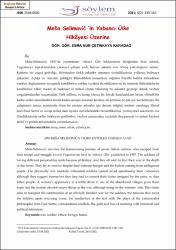| dc.contributor.author | Çetinkaya Karadağ, Esma Nur | |
| dc.date.accessioned | 2023-02-01T11:33:11Z | |
| dc.date.available | 2023-02-01T11:33:11Z | |
| dc.date.issued | 2021 | en_US |
| dc.identifier.citation | Cetinkaya Karadag, E.N. (2021). Meša Selimović ‘in Yabancı Ülke Hikâyesi Üzerine. Meša Selimović ‘in Yabancı Ülke Hikâyesi Üzerine, 6(2), 339-350. https://doi.org/10.29110/soylemdergi.915523 | en_US |
| dc.identifier.issn | 2548-0502 | |
| dc.identifier.uri | https://doi.org/10.29110/soylemdergi.915523 | |
| dc.identifier.uri | https://hdl.handle.net/11436/7492 | |
| dc.description.abstract | Meša Selimović, 1957’de yayımlanan Yabancı Ülke hikâyesinde birliğinden firar ederek,
Yugoslavya topraklarından çıkmaya çalışan yedi İtalyan askerin eve dönüş yolculuğunu anlatır.
Kaderin bir araya getirdiği, birbirinden farklı askerler ormanın derinliklerinde yollarını bulmaya
çalışırlar. Açlığa ve nereden geldiğini bilmedikleri kurşunlara rağmen hayatta kalma mücadelesi
verirler. Başkalarının savaşında kendilerine verilen vazifeyi ifa ettiklerini ve bu nedenle öldürdüklerini
kendilerine telkin etseler de bedensel ve ruhsal olarak tükenmiş bu askerler geçmişe dönük vicdani
sorgulamalardan kaçamazlar. Terk edilmiş ve harap olmuş bir köyde karşılaştıkları beyaz elbiseli bir
kadın onları umutlandırır ancak kadın savaşın kazanan tarafına ait görünse de çok şey kaybetmiştir. Bu
çalışmanın amacı, resmiyette biten bir savaşın askerler için devam ettiğini, metnin varoluşçu filozof
Jean-Paul Sartre’ın savaşı temel alan tiyatro metinlerindeki benzerliklerini, profesyonel askerlerin eve
döndüklerinde onları bekleyen gerilimleri, vicdani çatışmaları, suçluluk duygusunu ve anlam kaybını
tarihî ve politik referanslarla yorumlamaktır. | en_US |
| dc.description.abstract | Meša Selimović narrates the homecoming journey of seven Italian soldiers who escaped from
their troops and struggle to exit Yugoslavian land in Yabancı Ülke, published in 1957. The soldiers all
having different personalities unite because of destiny, and they all wish to find their way in the depth
of the forest. They try to survive despite their extreme hunger and the bullets coming from ambiguous
points. The physically and mentally exhausted soldiers cannot avoid questioning their conscience
although they suggest themselves that they had to commit their duties assigned by the army, so they
killed people. A woman’s appearance in a white dress in one of the abandoned villages gives them
hope, but the woman also lost many things in the war, although being on the winners’ side. This study
aims to interpret the continuation of an officially finished war for the soldiers, the tensions that await
the soldiers upon returning home, the similarities of the text with the plays of the existentialist
philosopher Jean-Paul Sartre, conscientious conflicts, the guilt and loss of meaning with historical and
political references. | en_US |
| dc.language.iso | tur | en_US |
| dc.rights | info:eu-repo/semantics/openAccess | en_US |
| dc.subject | Savaş | en_US |
| dc.subject | Asker | en_US |
| dc.subject | Ahlak | en_US |
| dc.subject | Yabancı | en_US |
| dc.subject | Ev | en_US |
| dc.subject | War | en_US |
| dc.subject | Soldier | en_US |
| dc.subject | Ethics | en_US |
| dc.subject | Foreign | en_US |
| dc.subject | Home | en_US |
| dc.title | Meša Selimović ‘in yabancı ülke hikâyesi üzerine | en_US |
| dc.title.alternative | On Meša Selimović’s story entitled foreign land | en_US |
| dc.type | article | en_US |
| dc.contributor.department | RTEÜ, Rektörlüğe Bağlı Bölümler, Yabancı Diller Bölümü | en_US |
| dc.contributor.institutionauthor | Çetinkaya Karadağ, Esma Nur | |
| dc.identifier.doi | 10.29110/soylemdergi.915523 | en_US |
| dc.identifier.volume | 6 | en_US |
| dc.identifier.issue | 2 | en_US |
| dc.identifier.startpage | 339 | en_US |
| dc.identifier.endpage | 350 | en_US |
| dc.relation.journal | Söylem Filoloji Dergisi | en_US |
| dc.relation.publicationcategory | Makale - Uluslararası Hakemli Dergi - Kurum Öğretim Elemanı | en_US |


















